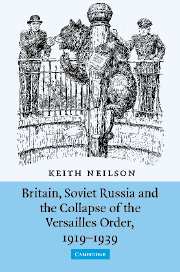Book contents
- Frontmatter
- Contents
- Acknowledgements
- List of abbreviations
- Introduction
- 1 The period of persuasion: British strategic foreign policy and Soviet Russia, 1919–1933
- 2 1933–1934: parallel interests?
- 3 A clash of sensibilities: January to June 1935
- 4 Complications and choices: July 1935–February 1936
- 5 Soviet Russian assertiveness: February 1936–July 1937
- 6 Chamberlain's interlude: May 1937–September 1938
- 7 Chamberlain as Buridan's ass: October 1938–September 1939
- Conclusion
- Appendix I
- Appendix II
- Appendix III
- Bibliography
- Index
7 - Chamberlain as Buridan's ass: October 1938–September 1939
Published online by Cambridge University Press: 18 July 2009
- Frontmatter
- Contents
- Acknowledgements
- List of abbreviations
- Introduction
- 1 The period of persuasion: British strategic foreign policy and Soviet Russia, 1919–1933
- 2 1933–1934: parallel interests?
- 3 A clash of sensibilities: January to June 1935
- 4 Complications and choices: July 1935–February 1936
- 5 Soviet Russian assertiveness: February 1936–July 1937
- 6 Chamberlain's interlude: May 1937–September 1938
- 7 Chamberlain as Buridan's ass: October 1938–September 1939
- Conclusion
- Appendix I
- Appendix II
- Appendix III
- Bibliography
- Index
Summary
In the eleven months from the Munich settlement to the outbreak of war in Europe, there were two principal alternatives for British strategic defence policy. The first was Neville Chamberlain's approach. In Europe, this amounted to continued concessions to the dictator states (appeasement by another name), but this strategy was limited, both by the fact that there were fewer and fewer concessions left to give and by the fact that it showed no signs of achieving its goals. In the Far East, it meant accommodation with Japan, but Tokyo's continued aggression meant that accommodation was hard to effect without alienating both public opinion and the United States. The second alternative was to take up arms in conjunction with others and oppose the revisionist Powers. But would Chamberlain accept this? And would the other Powers adhere to such a British policy after years of being snubbed or fobbed off with excuses? France, certainly, had few alternatives, but Soviet Russia had two: it could either retreat into isolation or mend its fences with Germany.
Chamberlain's freedom of action was less during this period than it had been before Munich. Although only Duff Cooper had resigned after Munich, the Cabinet was more restive than before, and small ‘groups’ of parliamentarians – Eden's ‘glamour boys’ (now led by Leo Amery) and Churchill's supporters – who disliked Chamberlain's foreign policy had formed.
- Type
- Chapter
- Information
- Publisher: Cambridge University PressPrint publication year: 2005

